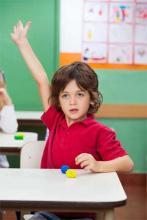
Self-regulation is the ability to control and manage one’s own thoughts, feelings, and actions. For a child, good self-regulation can be demonstrated simply by raising his hand when asking a question in class or in a more complex way by controlling his feelings when angry or frustrated.1 A child with poor self-regulation is often impulsive, hypersensitive to transition, and tends to overact to minor challenges or stressors. He may be physically hyperactive or may be withdrawn and inattentive.2
Both cognitive and social-emotional regulation are involved in self-regulation. Cognitive self-regulation involves children having control of their thinking. They can think ahead, plan, and evaluate their actions. From learned experiences they remember things they need to know to remind them how to act in a given situation.3
Social-emotional self-regulation involves being able to inhibit and delay gratification. It also means being able to internalize standards of behavior and then applying these standards without being reminded. Controlling emotions and not exhibiting reactive behavior show good self-regulation.4
Self-regulation is a learned skill. At home and in the classroom, if a child is provided organization, consistency, and structure, he is more likely to develop self-regulation. Rules that are taught and consistently enforced help children practice controlling themselves. The playground offers many opportunities for children to develop self-regulation when playing classic games, such as Simon Says and Red Light, Green Light.5 Through play, children learn to take turns, delay gratification, negotiate conflicts, solve problems, acquire flexibility, share goals, develop empathy, and live with disappointment.6
Another powerful tool to help children develop self-regulation is playing make believe. During make believe children talk to themselves about what they are going to do and how they are going to do it. They pretend to be someone else for an extended period of time resisting impulses to do something else. When one child pretends to be the teacher, the other children pretend to be the students and continue their story for a time, which in turn helps them develop self-regulation.7
Researchers have found that young children’s self-regulation is uniquely related to their academic abilities, over and above their intelligence. Their ability to plan, problem solve, and have goals to direct their activities is predictive of all academic outcomes, particularly associated with their early ability in math.8 The need for young children to develop self-regulation skills was also demonstrated by a study done that showed children with higher self-regulation skills scored higher on math, reading, and vocabulary testing. A child’s ability to listen and pay attention, think, and then act was an indicator of success in school.9
By the time children start school, they are expected to sufficiently be able to pay attention and control their emotions and impulses so that they can communicate effectively in the classroom and engage in learning experiences. Some children, particularly those from low-income homes, have been shown to be slow in developing self-regulation abilities, which may lead to problems in transitioning to school and increase their risk for early school failure.10
Research has also shown that how well a person does in life can be traced to self-regulation. A 32-year study showed that those who scored lowest on self-control measures were significantly more likely to have chronic health problems, have difficulty managing finances, have drug or alcohol addictions, have a criminal record, and be a single parent. Generally, if children have difficulty with self-regulation, they will most likely continue to experience difficulty as adults. Only 7% of participants in the study improved their self-control, probably from a change in their family life or school situation.11
- 1. Hoffman, Todd. “Self-Regulation: The Key to Successful Students?” Education.com. < http://www.education.com/magazine/article/self-regulation-children/ > 17 Feb. 2011.
- 2. Perry, Bruce D. “Keep the Cool in School: Self-Regulation – The Second Core Strength.” Scholastic. < http://www2.scholastic.com/browse/article.jsp?id=3746176&FullBreadCrumb=%3Ca+href%3D%22http%3A%2F%2Fwww2.scholastic.com%2Fbrowse%2Fsearch%2F%3FNtx%3Dmode%2Bmatchallpartial%26_N%3Dfff%26Ntk%3DSCHL30_SI%26query%3Dkeep%2520the%2520cool%2520in%2520school%3A%2520self-regulation%26N%3D0%26Ntt%3Dkeep%2Bthe%2Bcool%2Bin%2Bschool%253a%2Bself-regulation%22+class%3D%22endecaAll%22%3EAll+Results%3C%2Fa%3E > 17 Feb. 2011.
- 3. Leong, Deborah J. and Elena Bodrova. “Staff Workshop Teacher Handout: Self-Regulation in the Early Childhood Classroom.” Scholastic. Early Childhood Today. Sept. 2003. < http://www2.scholastic.com/browse/article.jsp?id=3747131 > 17 Feb. 2011.
- 4. Ibid.
- 5. Op. cit., Hoffman, Todd.
- 6. Christakis, Erika and Nicholas Christakis. “What to get your kids into college? Let them play.” CNN. < http://www.cnn.com/2010/OPINION/12/29/christakis.play.children.learning/index.html?iref=allsearch > 14 Jan. 2011.
- 7. Op. cit., Hoffman, Todd.
- 8. “Self-Regulation Abilities, Beyond Intelligence, Play Major Role In Early Achievement.” ScienceDaily. < http://www.sciencedaily.com/releases/2007/03/070326095349.html > 17 Feb. 2011.
- 9. “Self-Regulation Key To Academic Success For At-Risk Children.” Oregon State. < http://oregonstate.edu/ua/ncs/archives/2010/apr/risk-children-who-can-self-regulate-behavior-have-higher-test-scores-their-peers > 17 Feb. 2011.
- 10. Op. cit., “Self-Regulation Abilities, Beyond Intelligence, Play Major Role In Early Achievement.”
- 11. Goodman, Brenda. “Self-Control in Childhood Brings Adult Success.” WebMD. < http://children.webmd.com/news/20110124/self-control-in-childhood-brings-adults-success?page=2 > 17 Feb. 2011.

